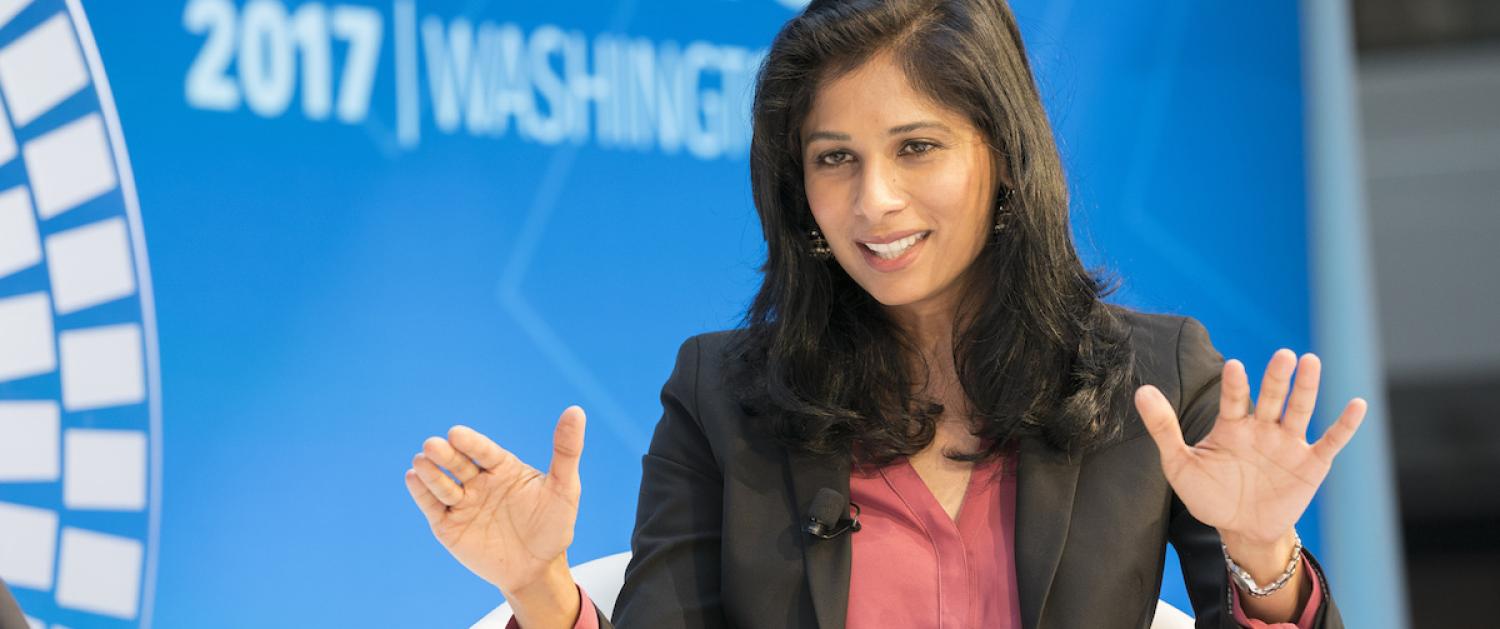Gita Gopinath has been appointed as Chief Economist at the International Monetary Fund, to take over from Maurice Obstfeld at the end of the year.
She is academically well-qualified. The job, however, is not just about academic economics. The IMF is like a priestly order, with established doctrines that evolve slowly, often against opposition from the long-serving staff and the diverse country shareholders.
The Chief Economist can play a key role in driving necessary changes in IMF thinking, but this requires bureaucratic and diplomatic skills of the highest order.
The Chief Economist can play a key role in driving necessary changes in IMF thinking, but this requires bureaucratic and diplomatic skills of the highest order.
Gopinath is a professor at Harvard University. The last internal appointment to this job was Michael Mussa (who held the job from 1991 to 2001). Since then, top academics have been appointed, all from US universities. Some have had quite short tenure, which may reflect the challenges of working with the Fund’s byzantine governance structure.
Perhaps the most successful of the recent appointments was Olivier Blanchard, who stayed seven years, beginning at the time of the Global Financial Crisis. He is a “salt-water” economist, ready to acknowledge flaws on the free-market system and advocate an active role for economic policy. The IMF was slow to recognise that the widespread budget austerity in 2010-2014 was inhibiting a normal recovery from the global financial crisis, but Blanchard was among the first to acknowledge the mistake. His non-doctrinal approach was helpful as the IMF softened its opposition to capital flow management.
The research department may be the intellectual centre of the IMF, but this department has only around 3% of total staff and produces only about a fifth of the total research output. Much research is done in the country departments, focusing on policy issues in specific countries. The functional departments (capital markets and fiscal affairs) dominate research in their specialist areas.
Over the years, the IMF has developed policy frameworks, often given the short-hand title of the “Washington Consensus”, with a strong belief in market-determined outcomes and fiscal rectitude. Many of the long-serving staff hold strong views on these issues, and see their detailed knowledge of history and specific country circumstances as being more relevant than current academic thinking.
This is the environment in which Gopinath will operate. Her academic work has shown flexibility and the readiness (even an eagerness) to confront and challenge accepted economic wisdom. This 2016 interview (and its links) gives an excellent backgrounder. Her focus has been on exchange rate issues, but her work also delves into micro issues.
Where is the IMF most in need of a fresh academically oriented input? While the research department has been active in pressing the case for capital flow management, this is not yet fully accepted by all IMF staff, and runs into opposition from country shareholders who assert their influence by way of the 24-member Executive Board.
The outcome is, as usual, a squishy compromise where all views are represented in policy documents, leaving room for everyone to advocate and pursue their own beliefs at the operational level.
Exchange rates are another area in debate. The Washington Consensus advocating free-floating exchange rates still holds sway. Intervention is always at the bottom of the list of policy options, contemplated reluctantly only when all else fails. Gopinath comes to this issue with a recognition that markets don’t always smoothly establish the equilibrium exchange rate, especially when under pressure and market participants are uncertain. Currently this debate is being played out in Argentina.
Overlaying these traditional debates on exchange rates is US President Donald Trump’s concerns about “exchange rate manipulation”. This debate has some distance to run, and the role of the IMF will be watched with interest. Ensuring appropriate exchange rates is, after all, the IMF’s traditional central concern.
Other vexed issues await. The IMF has never satisfactorily resolved what it should do when a country borrows too much and faces not just liquidity problems, but solvency issues. Existing debt should be written down or rescheduled, but creditors have often exercised strong pressure to avoid recognising this. Meanwhile, the job of the IMF is to provide new funds to avoid a crisis. Should this money be used to rescue not only the troubled country, but the creditors as well? Greece is a recent example of this unresolved issue. Argentina’s recent US$57 billion IMF program provides another example, designed to buy more time to solve the legacy of the 2001 default and subsequent years of failed or half-hearted reforms.
On top of these policy debates, Gopinath will have a heavy work-load of input into the regular publications by the IMF, especially the excellent biennial World Economic Outlook. We should all wish her good luck in this demanding role.

